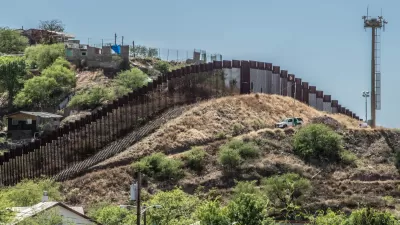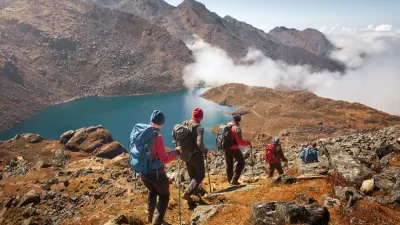An analysis of Planetizen traffic in the first six months of the Trump Administration reveals an audience still focused, despite so many distractions, on the future of communities.

The question, the big question, facing many media outlets is whether the daily surprises and outrages of the current political climate will leave any oxygen for other topics. The big question is particularly pressing at Planetizen. Planning, with its acronym-laden jargon and slow bureaucratic processes, had to compete with sexier subject matter long before the recent presidential election. Now planning has to compete with an attention grabbing cast of characters like The Mooch, Spicey, and, well, President Donald Trump, for the attention of a busy public.
I remember reading sometime in June 2015, around the time Donald Trump announced that he would run for president, that the only concern about his candidacy was that he would steal debate time from serious candidates, temporarily transforming the race—which he would eventually, inevitably depart—into a crass publicity stunt. That prediction seems quaint by comparison to the current reality of the world. It's obvious now that Trump did much more than steal debate time: With seemingly endless capacity for variations on this theme, President Donald Trump has completely redefined the American public's relationship to information.
Every day since the beginning of the presidential campaign has offered a test of the public's capacity for information intake. Meanwhile, the media is challenged every day to differentiate public interest stories from an onslaught of information—only some of it useful and subject to rigorous standards of accuracy and verification. Planetizen doesn't cover splashy stories about collusion, taxpayer-funded golf rounds, and skinny repeals, so how are we to convince people that stories about community development block grants, tax increment financing, and total maximum daily loads still matter?
The possibilities of what the role of Planetizen could be in this new political and media environment are almost endless. The Trump Administration's dominance of the news cycle could overwhelm and supersede the public's interest in planning and its related fields. The Trump Administration's dominance of the news cycle could also alienate the public from mainstream news outlets, sending new audiences to niche publications like Planetizen, desperate for news about anything other than Trump. The reality is probably somewhere in the middle, and on a sliding scale that moves every day.
Without knowing which of these scenarios will prove true over time, or even on any given day, we have had to set and maintain standards for the stories we share. Our goal, so far, is to persist in sharing news about the Trump Administration, not succumbing to fatigue or any arbitrary dismissals, but also avoiding as much as possible cheap thrills or confirmation bias. The reality of the product is probably somewhere in the middle, and on a sliding scale that moves every day.
The evaluation of these scenarios is aided by the real-time flow of analytics. We know which articles the audience is reading, how the audience is finding those articles, and which articles the audience has ignored (relatively). We constantly analyze the data we receive from clicks, shares, and time spent on the website to discover more about what matters to the audience, but also to look for better ways to share and discuss the issues that probably would matter to the audience, if the audience were made aware.
Now, more than six months into President Trump's term, we have enough information to draw some conclusions about whether, why, and, how planning still matters. I recently used Google Analytics to create a list of the 250 pages on Planetizen that received the most visits between January 1 and June 30, 2017. There are somewhere in the ballpark of 95,000 pages on this website, so these top 250 represent the best performers of a period that featured President Donald Trump, promises of massive infrastructure investments, a Muslim ban, a trans ban, a Supreme Court appointment, terrorist attacks, all-night CSPAN binges, and a renaissance for Saturday Night Live.
The Planetizen audience has proven receptive to the less sensational variety of news about the Trump Administration—stories about budget processes, federal land, and the single key to President Trump's immigration and infrastructure agendas: the border wall.
The dominant planning trend so far in 2017, however, has more to do with Jeff Bezos that Donald Trump. Repeatedly, and even reaching back to articles from several years ago, the list of most-read posts includes news and analysis on the fate of traditional retail. Here we see the Planetizen audience's obvious concern for an ongoing trend that will have a lasting effect on the planet and society long after the Trump Administration is termed, or voted, out of office.
Normally we would call an analysis like this a "Top Trends" post—holding up a mirror, of sorts, by sharing what we know about the Planetizen audience's interests and concerns. In this case, Trump is surely looming behind and perhaps over this reflection. This is planning news in Trump's new world.
The End of Retail. The Beginning of Retail.
Three of the most popular stories (inside the top 50 most-visited posts) from the past six months predate the Trump Administration:
- Why Do Certain Retail Stores Cluster Together? (19)
- The Changing Nature of Retail: The Impact of Online Shopping on Cities (21)
- Yes You Can (Get Groceries Without a Car) (44)
Another retail-related story, of the extremely topical variety, appeared in the top 50 most-visited pages in the first six months of 2017:
More stories appeared further down the list:
- Which U.S. Cities Have the Highest Density of Microbreweries (78)
- Friday Fun: The Top 50 Breweries in America (124)
- The Suburbs Will Lose the Most in an Era of Shrinking Retail (196)
- Credit Suisse Says One in Every Four U.S. Malls Will Be Gone by 2022 (208)
- Is Payless Shoesource Bankruptcy a Sign of the Coming 'Retail Apocalypse'? (213)
These stories reflect both sides of the narrative about retail: On one hand is the loss of jobs and tax base for communities that are watching traditional retail models disappear. Like the concern that fueled the auto industry bailout in 2008 and 2009, planners and city officials are trying to anticipate and looking for ways to redevelop vacant commercial properties.
On the other hand are the successes that businesses and communities have already had in discovering new business models and new uses. We're talking about beer, for the most part, so there's more work to be done. Clearly, despite the amount of coverage that has been devoted to this subject, the fate of brick and mortar retail businesses still might be an underreported sign of the times.
An Urbanization Fascination
Another theme that emerges when perusing the list of 250 most-visited pages is the ongoing interest in the "back to the city" narrative that has redefined the planning discussion in the past decade-plus.
- America's Largest Suburb Flirts With Urbanization (27)
- Unaffordability is a Problem but Sprawl is a Terrible Solution (36)
- Which Is the Most Sprawling City in the World? (40)
- Eight Cities Rolling Out Streetcar Projects (41)
- New Urbanism Emerged in Response to Sprawl, but Does it Really Offer an Alternative? (45)
- Which Cities Are Gentrifying (49)
- The Atlas of Urban Expansion Shows How Cities Grow (54)
- The 27 Typical Patterns of Urban and Suburban Development (55)
- To Save New Urbanism From #MAGA, it's Time to Get Political (62)
- The New Urban Crisis and the High Line (90)
- Incremental Development: The Craft Beer Model of Walkable Places (95)
- Richard Florida Takes a Detour (105)
- The Evolution of Green Urbanism (134)
- Where Millennials Are Entering the Homebuying Market (144)
- Florida, Florida, Florida (158)
- Seattle releases Draft Rezonings for its 'Urban Villages' (194)
- Hey Young People! Stay in Your Parents' House Forever! (214)
- Know of Any 'Suburbs in Name Only'? (216)
- Opinion: Don't Forget the Benefits of Urban Freeways (219)
- New Census Data Confirms: Suburban Areas Lead U.S. Growth (225)
- Sun Belt Sprawl Might Not Be Forever (241)
Many of the posts at the end of this list indicate how this back to the city narrative has changed in 2017. Richard Florida, who wrote the book on the urban revitalization capacity of young, tech-savvy entrepreneurs, released a new book this year called the New Urban Crisis. The new book acknowledges some of the negative consequences of the urban revival, namely segregation, displacement, and an unprecedented housing crisis.
Meanwhile, these posts also reveal a trend that some have long foretold: the urban wave has crested, and Millennials looking to begin families are looking to the suburbs again. That's one theory anyway. The other: that most Americans have simply been locked out of urban areas by high costs, and they are looking to the suburbs.
Either way, the demand for living and working in the built environment isn't going anywhere. How the planners, policymakers, and the market respond to the demand is far from certain.
And Then There Was Trump
For all the articles we tagged with Trump Administration, few managed to appear on this list.
- Trump's California Double Play: Potential Fatal Blow to Commuter and High-Speed Rail (30)
- Trump Budget Blueprint Would Nix Federal Transit Spending (50)
- Planning and the Alt Right in the Time of Trump (53)
- To Save New Urbanism From #MAGA, it's Time to Get Political (62)
- A First Look at Proposed Border Wall Designs (85)
- Trump: The Ultimate Unintended Consequence (114)
- House Republicans: No More 'Planning 2.0' for Public Lands (127)
Despite the small number of popular stories compared to the amount of Trump Administration stories we posted, this list, for the most part, reflects an interest in posts that don't follow the narrative being sold by television news, the mainstream media, and the thinly veiled propaganda of media outlets more concerned with ideology than accuracy. Still, many stories of significance to the practice of planning and its related professional and academic fields are still falling through the cracks. Perhaps it's because planners are finding this news from other sources. Or perhaps it's as we feared—once CNN, Fox News, and The Washington Post get done with us, we don't have any capacity to consider the nitty gritty. Or perhaps its because most planners, like many Americans, are more worried about the neighborhoods and communities than they are about the latest palace intrigue.
Lately, we have been tagging stories related to the federal budgetary process with the name of the Trump Administration's budget blueprint, "America First: A Budget Blueprint to Make America Great Again." The congressional appropriations process, in dialectic with the Trump Administration's budget blueprint, will be one of the first signals of the political strength of the Trump agenda and its potential effect on the practices of the built and natural environment. As the administration moves forward, and its influence begins to sway national events and public policy, it will be harder to separate Trump's potential from the nation's reality.
The budget process will also be one of the first signals of our capacity to retain an informed skepticism in the face of propaganda and sensationalism. For every article that fails to describe "America First: A Budget Blueprint to Make America Great Again" as an extremely speculative and aspirational document, we should recall the lessons from the Obama Administration's budget blueprints. Then, every discussion of Obama's budget proposals came with a caveat about the likelihood of its approval. Yes, Trump's budget blueprint signals his administration's agenda, but describing it as accepted policy signals a willingness to distort news into a scare tactic.
There is good, valuable information to be found among the noise and the waste. May we continue to find our footing, and our voice, in the new world.

Planetizen Federal Action Tracker
A weekly monitor of how Trump’s orders and actions are impacting planners and planning in America.

Congressman Proposes Bill to Rename DC Metro “Trump Train”
The Make Autorail Great Again Act would withhold federal funding to the system until the Washington Metropolitan Area Transit Authority (WMATA), rebrands as the Washington Metropolitan Authority for Greater Access (WMAGA).

DARTSpace Platform Streamlines Dallas TOD Application Process
The Dallas transit agency hopes a shorter permitting timeline will boost transit-oriented development around rail stations.

Renters Now Outnumber Homeowners in Over 200 US Suburbs
High housing costs in city centers and the new-found flexibility offered by remote work are pushing more renters to suburban areas.

The Tiny, Adorable $7,000 Car Turning Japan Onto EVs
The single seat Mibot charges from a regular plug as quickly as an iPad, and is about half the price of an average EV.

Supreme Court Ruling in Pipeline Case Guts Federal Environmental Law
The decision limits the scope of a federal law that mandates extensive environmental impact reviews of energy, infrastructure, and transportation projects.
Urban Design for Planners 1: Software Tools
This six-course series explores essential urban design concepts using open source software and equips planners with the tools they need to participate fully in the urban design process.
Planning for Universal Design
Learn the tools for implementing Universal Design in planning regulations.
Municipality of Princeton
Roanoke Valley-Alleghany Regional Commission
City of Mt Shasta
City of Camden Redevelopment Agency
City of Astoria
Transportation Research & Education Center (TREC) at Portland State University
US High Speed Rail Association
City of Camden Redevelopment Agency
Municipality of Princeton (NJ)





























